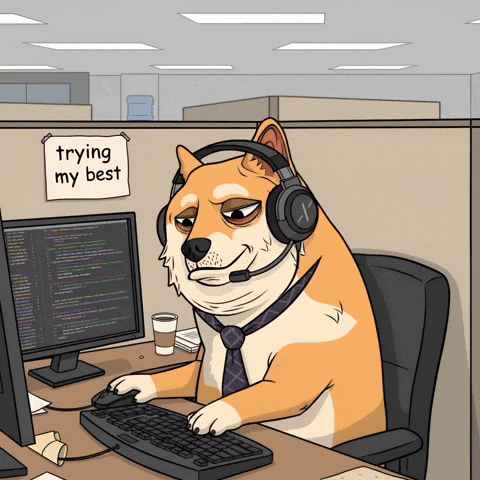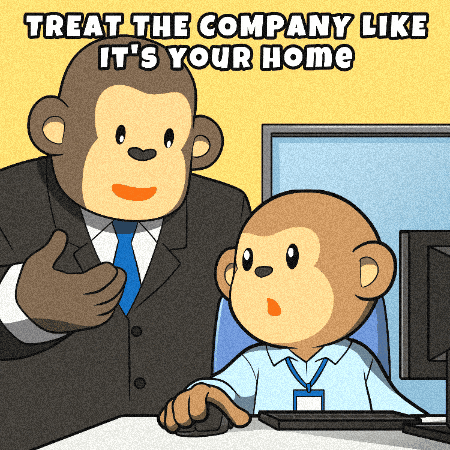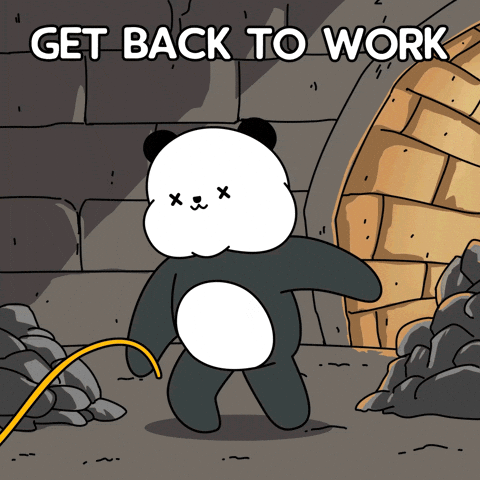Overworked, Underpaid, Overqualified, Under-utilized

In The Roadtrip: A Self-Guide to Success, the journey isn’t just about the destination; it’s about navigating the twists and turns of work, life, and self-worth. Today, let’s talk about a common crossroad: feeling overworked, underpaid, overqualified, and under-utilized—and what you can do about it.
Ever feel like you’re a headless chicken running a marathon at work—but everyone else is walking, cruising actually? You’re giving your all, putting in the hours, going the extra mile, bending over backwards and selling your soul for peanuts yet recognition and growth seem like distant checkpoints. If this feels familiar, you’re not alone.
Many of us have been there, are there, or are getting there—stuck in roles that don’t match our effort, skills, or potential. It’s that point of realization where your job is no longer a passion, but a means to an end—just enough to pay half the bills while your side hustle becomes your second job. We wake up to spend our days around people we barely tolerate but must smile with for “professionalism.” We fake-laugh at the manager’s lame jokes to avoid being labelled “not a team player.”
And when it comes to sending that email, we end it with “Kindly action this at your earliest convenience”—when what we really want to say is “Can you just F@$#* do what I am asking you !@&%#@%&@#*&!”
Breathe… Let’s lock-in.
Overworked

Being overworked isn’t just about clocking in long hours — it’s when the balance between what you give and what you get is completely out of sync. It’s the point where your physical, emotional, and mental energy are consistently drained faster than they can recover.
In simple terms: you’re running on fumes but still expected to accelerate. It’s like driving your car on E to get to your destination but confidently saying “I know my car“. No, you’re choking the life out of your vehicle Sandra!
Where It Stems From
Overworking often starts as dedication — wanting to prove yourself, secure that promotion, or keep the team afloat. But slowly, it turns into expectation. What was once going the extra mile becomes the new standard.
The pressure can stem from:
- Toxic work cultures that glorify busyness over productivity.
- Poor management where tasks aren’t distributed evenly.
- Management overcompensating at the expense of labour force.
- Unclear boundaries — especially if you’re the “reliable one.”
- Personal guilt or fear of being replaced.
- Economic pressure — when one income isn’t enough, and side hustles fill the gap.
It’s not always the company’s fault; sometimes it’s the system, the economy, or even our own belief that “if I’m not tired, I’m not doing enough.”
Signs You’re Overworked
- You’re constantly tired, even after a weekend of “rest.”
- You can’t remember the last time you took a proper lunch break.
- Your patience runs thin — small things trigger big reactions.
- You’ve lost interest in hobbies or socializing or you start abusing substances as an outlet.
- You find yourself thinking about quitting every other day.
- You feel guilty when you’re not working.
If these sound familiar, it’s time to slow down.
How to Address It with Management

Approaching management about being overworked can be tricky — but it’s essential. Here’s how to frame it without sounding like you’re complaining, insubordinate or not a team player:
- Gather evidence. Track your workload, hours, and additional tasks you’ve taken on. Data speaks louder than frustration.
- Reframe the conversation. Instead of saying “I’m overworked,” try “I’ve noticed my workload has increased significantly — can we discuss prioritizing tasks or redistributing responsibilities?”. Provide solutions to your problem
- Offer solutions. Suggest ways to streamline tasks, delegate, or clarify priorities. Show initiative, not resistance.
- Know your rights. Check your employment contract or labour law provisions around working hours and overtime pay. Give facts not feelings.
- Set boundaries. Respectfully communicate when you are unavailable — overworking becomes a habit only if you allow it. You can catch more flies with honey, but never with vinegar.
What To Do About It
Burnout is real, and it sneaks up quietly. You might be taking on extra responsibilities, skipping breaks, or working late to meet expectations that feel impossible. Overworking can drain not just your energy, but your creativity and motivation.
You can’t pour from an empty cup — and you definitely can’t drive your roadtrip to success with no fuel. So, while you are waiting on management to decide your fate, here’s how to start recovering:
- Pause and reassess. Write down all your responsibilities and mark what truly adds value.
- Delegate or drop. Not everything that’s urgent is important.
- Create boundaries. Decide what time your “engine shuts off” each day — and stick to it.
- Take micro-breaks. Even 10 minutes away from your screen can reset your focus (depending on your industry).
- Reclaim personal time. Rest is not a reward; it’s maintenance.
- Ask for help. Whether it’s a mentor, colleague, or HR — seek support before burnout forces you to.
Your career is a roadtrip; don’t drive yourself into the ditch. Take the rest stops you need.
Underpaid

Nothing saps motivation faster than feeling your effort aren’t matching your paycheck. Being underpaid can make even a dream job feel like a grind.
Being underpaid isn’t just about earning less than you’d like — it’s about earning less than what your skills, effort, and impact are truly worth. It’s when your payslip doesn’t match your contribution, and each month feels like a reminder that hard work alone doesn’t always equal fair reward.
Simply put; you’re giving champagne effort for tap-water wages.
Where It Stems From
The roots of underpayment run deep — and they’re not always personal. It’s a mix of systemic, structural, and sometimes self-imposed factors:
- Wage stagnation — salaries staying flat while the cost of living skyrockets.
- Poor salary transparency — many don’t know what others earn, so they accept less.
- Qualification/Education — It would be unreasonable to not expect a Cashier’s salary but rather that of a Charted Accountants when you only have Matric.
- Employers undervaluing roles — especially in industries that exploit passion (“You’re lucky to work here”).
- Incentive adjustments — More often than not, your entire salary might change because of what we previously said “What was once going the extra mile becomes the new standard.“
- Lack of negotiation confidence — fear of seeming “ungrateful” or “replaceable.”
- Economic pressure — high unemployment or few job options in your area.
In truth, being underpaid often starts when we accept “just to get by” pay — and stay there too long.
Signs You’re Underpaid
- You’ve been in the same role for years with little or no raise.
- Your responsibilities have increased, but your salary hasn’t.
- You avoid checking your bank account — it’s predictable disappointment.
- You’re working multiple jobs just to make ends meet.
- You’ve stopped believing you deserve more.
If that last one hit hard, pause — that’s the mindset that traps most people in low-paying cycles.
What It Leads To

Staying underpaid for too long can quietly corrode your confidence and motivation. The effects are more than financial:
- Resentment towards your job or management.
- Decreased engagement — doing the bare minimum to survive.
- Mental fatigue from juggling multiple side hustles just to stay afloat.
- Self-doubt — questioning your worth or abilities.
- Career stagnation — when you’re too tired to look for better opportunities.
In time, the issue isn’t just low pay — it’s lost purpose.
How to Address It with Management
Talking about money can feel awkward, but silence often costs you more. Addressing pay gaps requires both strategy and self-worth.
Here’s how to do it smartly:
- Do your homework. Research what others in your position (with similar experience) earn — use salary guides or platforms like PayScale.
- Document your value. List your achievements, responsibilities, and results you’ve delivered since your last review. Numbers speak volumes.
- Pick your timing. Avoid bringing it up during chaos; aim for performance reviews or scheduled one-on-ones. Relaxed settings make managers feel less threatened.
- Frame it professionally. Instead of “I need a raise,” say: “I’ve taken on additional responsibilities and consistently delivered [specific results]. I’d like to review my compensation to ensure it reflects my contribution.” Speak only for yourself.
- Be prepared for pushback. If the company truly can’t raise pay, ask about non-financial rewards (remote work, bonuses, training, flexibility). Show interest to Expand for opportunities.
You can’t demand value from others if you haven’t first recognized it in yourself.
What To Do About It
Money isn’t everything, but let’s be honest — it matters – ALOT. Being fairly compensated is a form of respect.
Here’s how to start shifting things:
- Know your worth. Don’t just think it — calculate it. Track your results, outcomes, and growth.
- Learn to negotiate. Confidence at the table changes the outcome.
- Diversify your income. Side hustles aren’t shameful — they’re survival and strategy.
- Invest in yourself. Courses, certifications, and networking can open better-paying doors.
- Walk away if needed. Sometimes, the raise you’re waiting for isn’t coming. Your next opportunity might pay you what you’ve always deserved.
Remember: your time, energy, and talent are valuable commodities. Treat them as such.
Overqualified

Overqualification is a unique frustration. You know you could do more, yet your daily tasks barely scratch the surface of your abilities. Being overqualified means you have the skills, experience, and knowledge to perform at a higher level than your current role requires. You’re operating below your potential — capable of more, but stuck doing less.
It’s like driving a high-performance car in first gear. The engine’s ready to roar, but the road you’re on won’t let you move.
Where It Stems From
Overqualification isn’t always a result of poor career choices — sometimes it’s survival. Life happens, bills need paying, and not every opportunity aligns perfectly with your abilities or ambitions. But it also stems from:
- Job markets shrinking — fewer opportunities, more compromise.
- Employers hiring “safe” candidates to save costs or avoid turnover.
- Unrecognized talent — when your qualifications intimidate rather than impress.
- Personal transitions — changing industries, returning to work after a break, or relocating.
- Economic necessity — sometimes you take what’s available, not what’s ideal.
At first, it feels like a temporary stopgap — “just until something better comes.” But months turn into years, and frustration sets in.
What It Leads To
Being overqualified for too long can wear down even the strongest professionals. It’s a slow erosion of purpose and pride:
- Mental disengagement — you’re present, but not passionate.
- Frustration — every task feels like déjà vu.
- Under-recognition — others get credit for ideas you’ve already mastered.
- Career plateau — you stop learning, no challenges, no growth.
- Identity conflict — you start questioning whether your qualifications even matter.
It’s the quiet kind of burnout — the one that doesn’t come from doing too much, but from doing too little that matters.
Signs You’re Overqualified

- You poses formal education that supersede your current role.
- You’ve stopped updating your CV — because nothing new is happening.
- You feel more like a babysitter than a professional.
- You’re mentoring your own supervisor (and they don’t even realize it).
- You’ve outgrown your title, but your paycheck hasn’t caught up.
If that list stings a little, it’s because being overqualified doesn’t hurt your ego — it hurts your spirit.
How to Address It with Management
Being overqualified doesn’t mean you’re over everything — but it does require tact when discussing growth. Here’s how to approach it without sounding arrogant or restless:
- Frame it as value, not boredom. “I’ve noticed there are areas where I could contribute more or take on additional responsibility — would you be open to discussing that?” Remember you offer what they wouldn’t have.
- Express interest in mentorship or leadership. Let them see your extra capacity as an asset, not a threat. You are an asset not a liability.
- Ask for skill-aligned projects. Offer to assist in strategy, training, or innovation — anywhere your experience fits. Make them feel your presence.
- Communicate your long-term goals. Clarify that you’re invested, but also eager to grow. You are an investment.
- If growth isn’t possible, prepare your next move quietly. Loyalty is valuable, but so is your peace of mind. Always choose yourself first and always.
Remember: the goal isn’t to prove you’re overqualified — it’s to leverage it.
Ways to leverage your skills:
- Mentor colleagues or lead small projects.
- Take initiative to propose improvements.
- Explore lateral moves that challenge you.
Your extra skills aren’t wasted—they’re tools to carve your own path forward. So, in all that you do, do it with your interests in mind first and foremost.
Under-utilized

Being under-utilized can crush motivation and creativity. You feel like you’re stuck on the sidelines while your potential gathers dust. Being under-utilized means your talents, ideas, and energy are being left idle — like a high-powered engine left idling in a parking lot. You’re capable of far more than what you’re allowed or expected to do, and it slowly chips away at your drive.
It’s not just about boredom; it’s about being unseen.
Where It Stems From
Under-utilization happens when capacity meets complacency — either yours or your company’s. It can come from:
- Poor leadership — managers who don’t recognize or develop talent.
- Rigid structures — environments where initiative isn’t welcomed.
- Comfort zones — staying where it’s “safe” instead of where it’s stimulating.
- Limited opportunities — especially in smaller teams or stagnant industries.
- Fear of being “too much.” You shrink yourself to avoid intimidating others or rocking the boat.
In many workplaces, being capable can ironically make you invisible — because you make things look easy. I think this is a topic that deserves its own blog.
Signs You’re Under-Utilized
- You’re finishing tasks early — and scrolling out of boredom.
- Your ideas are dismissed or ignored in meetings.
- You’re not learning anything new.
- You daydream about doing work that actually excites you.
- You feel like your potential is rusting from lack of use.
The dangerous part? You can get comfortable there. And comfort can quietly kill growth.
What It Leads To

Being under-utilized doesn’t always look dramatic — but it’s one of the most silent forms of disengagement. It breeds:
- Complacency disguised as contentment.
- Apathy — you stop trying because it doesn’t seem to matter.
- Loss of motivation and purpose.
- Decline in confidence — when unused skills start to feel irrelevant.
- Emotional exhaustion — not from doing too much, but from doing too little that matters.
Eventually, the spark that once fuelled you dims — and you start to believe you’ve lost your edge, when in reality, you’ve just been parked too long gathering heavy dust.
How to Address It with Management
Addressing under-utilization isn’t about complaining that you’re bored — it’s about showing you want to contribute more. The difference is in the framing:
- Start with curiosity. “I’ve noticed I have additional capacity and would love to take on more challenging projects — is there an area you think I could add value?” Strive to learn more.
- Offer specifics. Suggest projects or improvements that align with your strengths. Target gaps.
- Communicate your growth goals. Managers appreciate initiative, especially when tied to organizational needs. Turn your ambition into strategy.
- Request feedback. Ask where you could stretch or improve — it keeps the conversation collaborative, not confrontational. Keep the target off your back.
- If nothing changes — take note. Consistent under-utilization is often a sign to move on. Engakhaliyo iyayekwa.
In this context the above loosely translates to: Don’t confuse patience with stagnation.
What To Do About It
Under-utilization is an opportunity in disguise — a nudge to reawaken your drive and redirect your talent.
Here’s how to reclaim your energy:
- Take initiative. Don’t wait for permission to show your worth — create, suggest, innovate.
- Volunteer beyond your role. Join projects, committees, or causes that stretch you.
- Build your own opportunities. Start a side project, passion venture, or professional network.
- Communicate clearly. Let leadership know you’re capable of more — and show it in results.
- Redefine your lane. Sometimes you outgrow the map you have. Don’t be afraid to redraw it.
Being proactive transforms frustration into opportunity. But be careful that this create an opportunity to overwork you. Needless to say, do not complain about what you asked for.

The Roadtrip Takeaway
Feeling overworked, underpaid, overqualified, or under-utilized doesn’t mean you’re stuck. It’s a sign: it’s time to recalibrate your journey.
Success isn’t just about reaching a destination—it’s about enjoying the ride, learning from detours, and making choices that align with your value, skills, and purpose.
Ask yourself: Which of these four frustrations hits closest to home? And what’s one step you can take today to navigate your roadtrip toward work that fuels, not drains, you?
Your journey is yours to steer. Don’t settle for a ride that doesn’t match your engine.
Speaking of engines, lets jump onto the next blog and discuss the 3-tiers of peak health and performance. The Mind, The Body and the Spirit and how to best prepare them for your journey.





